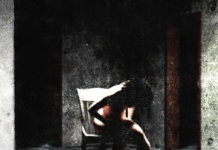I have to be honest with you about this, I adore the music that Ómoia make. With each and every release they seem to develop and build. And so it is with this double A side single ‘The Love We Keep’.
First we get to be stunned by ‘In This Moment’. This starts full of atmosphere, intense emotion and beauty and then, at about the halfway point, it explodes into something like a scream (and an actual scream at one point). This is about the build, it’s at that point that the emotion comes through. The band say that the song ‘offers an introspective look at the struggle of maintaining an outward appearance of happiness while feeling hollow and disconnected inside. It captures the yearning for emotional validation and the tension between vulnerability and the fear of being exposed. The facade of being “alive and functional” masks a deeper, more complex emotional battle’.
The rawness in the sound speaks to the song’s subject, with even the slower more melodic parts of the track not so smooth that they lose this raw emotional feel. In fact. In a way the structure of the song with a start that is beautiful and melodic with the intense louder sounds gradually coming through and then it returning, until the battle is won with the loud raw feel bursting through, speaks to the band’s description of the song.
This is beautiful, it’s that simple. It shows the band’s ability to tell a story in words and music.
The single’s second track ‘Section 28’ is about a law passed in 1988 that banned local councils and council funded schools – and I quote – from ‘promoting homosexuality’. There’s more about this below, but I remember the law being passed, and the effect it had on people well. I can also remember the joy that came with the law being repealed in the early 2000s after campaigns by the community, and the support of New Labour.
The song ‘explores the emotional and psychological harm caused by laws designed to erase identities, forcing silence and invisibility upon marginalised individuals’. And it does this both from the point of the LGBTQ+ community as a whole and individuals.
The band don’t spell out their reasons for writing the song, beyond recording a heinous period in UK history; but I see a parallel now in the way Trans’ Rights are being attacked now, and how similar attacks led to the introduction of Section 28. However, it is the case that unless we take note of what happened in the past we are destined to repeat our past mistakes.
This is an intensely powerful song. And is required listening.
Ómoia’s songs are not ‘easy listening’; they are full of overwhelming emotion and tell very personal stories. However, it is in this rawness that their realness and beauty lies. Take this and combine it with their music, and they can rip your heart out. If you are not a fan of Ómoia’s music then you should be, and if you are you know what to do.
The info
Section 28
Section 28 refers to a part of the Local Government Act 1988, which stated that local authorities in England, Scotland and Wales ‘shall not intentionally promote homosexuality or publish material with the intention of promoting homosexuality’ or ‘promote the teaching in any maintained school of the acceptability of homosexuality as a pretended family relationship’. It is sometimes referred to as Clause 28 or as Section 2A in reference to the relevant Scottish legislation.
The legislation came into effect during Margaret Thatcher’s premiership on 24 May 1988. It caused many organisations, such as LGBT student support groups to either close, limit their activities or to self-censor. In addition, Section 28 had a widespread impact on schools across the UK. This was due to uncertainty around what constituted the ‘promotion’ of homosexuality, leading many teachers to avoid discussing the topic in any educational context.
The path towards Section 28 started with rising discrimination against the LGBT community. This stigmatisation against gay and bisexual men increased during HIV/AIDS. The legislative path started with small steps that eventually resulted in Section 28.
Section 28 was first repealed in Scotland. It was subsequently repealed in England and Wales in November 2003, following New Labour’s initial unsuccessful attempt to repeal the legislation under the Local Government Act 2000.
Learn more on Wikipedia here https://en.wikipedia.org/wiki/Section_28








